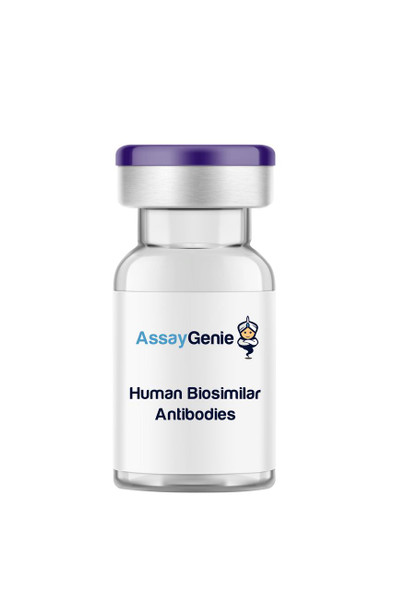Description
| Product Name: | Anti-Human CD49D (Integrin alpha 4) (Natalizumab) - APC |
| SKU: | IVMB0431 |
| Size: | 50 µg |
| Antibody Type: | Biosimilar Recombinant Human Monoclonal Antibody |
| Clone: | Hu114 |
| Target: | CD49D |
| Isotype: | Human IgG4κ |
| Host Species: | Human |
| Reactivity: | Human |
| Applications: | FC |
| Expression Host: | HEK-293 Cells |
| FC Effector Activity: | Active |
| Synonyms: | CD49D; alpha 4 subunit of VLA-4 receptor; ITGA4; Integrin alpha-IV |
| Product Concentration: | 0.2 mg/ml |
| Excitation Laser: | Red Laser (650 nm) |
| Immunogen: | RAMOS cell line injected into mice. |
| Applications and Recommended Usage: | FC The suggested concentration for Natalizumab biosimilar antibody for staining cells in flow cytometry is ≤ 1.0 μg per 106 cells in a volume of 100 μl. Titration of the reagent is recommended for optimal performance for each application. |
| Antigen Distribution: | CD49D is a subunit of the integrin VLA-4, which is expressed on the cell surfaces of stem cells, progenitor cells, T and B cells, monocytes, natural killer cells, eosinophils, and neutrophils. |
| Formulation: | This Allophycocyanin (APC) conjugate is formulated in 0.01 M phosphate buffered saline (150 mM NaCl) PBS pH 7.4, 1% BSA and 0.09% sodium azide as a preservative. |
| Specificity: | This non-therapeutic biosimilar antibody uses the same variable region sequence as the therapeutic antibody Natalizumab. Natalizumab binds to the alpha 4 subunit of α4β1 and α4β7 integrins. This product is for research use only. |
| Additional Reported Applications For Relevant Conjugates: | B |
Natalizumab is characterized as a disease-modifying therapy for multiple sclerosis (a disease of the central nervous system (CNS)), and inflammatory bowel disease. It works by inhibiting the migration of leukocytes to inflammation sites. The VCAM-1 and α4β1-integrin interaction is necessary for leukocyte adhesion, firm attachment, and transmigration across the blood-brain barrier into the CNS. Natalizumab, a recombinant, humanized antibody, binds to α4β1 -integrin and blocks its interaction with VCAM-1. Hence, leukocyte migration into brain tissue is inhibited, thereby reducing inflammation and preventing the formation of multiple sclerosis lesions.1 Inflammation in the gut pertaining to inflammatory bowel disease can be controlled in a similar fashion. Blocking α4β7-integrin with a humanized, monoclonal antibody, specific to the α4β7 heterodimer inhibits the migration of leukocytes into the inflamed intestinal tissue, thus, reducing inflammation in the gut.2 This cost-effective, research-grade Anti-Human CD49D (Natalizumab) utilizes the same variable regions from the therapeutic antibody Natalizumab making it ideal for research projects.
| Regulatory Status: | Research Use Only (RUO). Non-Therapeutic. |
| Storage and Handling: | This Allophycocyanin (APC) conjugate is stable when stored at 2-8°C.Do not freeze. |
| Research Area: | Biosimilars |






